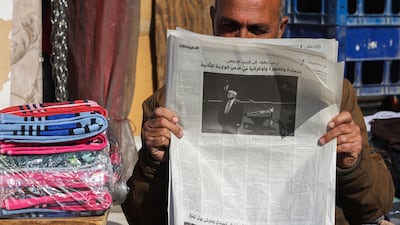With the change of administration in Washington, many observers predicted uncertainty regarding US policy in the Middle East, particularly towards Iraq. It is widely acknowledged that US President Donald Trump’s priorities focus on domestic issues such as immigration, economic reform and job repatriation. Nonetheless, his appointments of strong leaders to key foreign policy positions have signalled to the world a continued focus on maintaining US influence abroad in general and the Middle East, in particular.
Mr Trump and his team have already shown their commitment to preventing escalation. Indeed, their role in helping to achieve a ceasefire in Gaza was instrumental even before the President’s inauguration. Mr Trump has long been engaged on the subject of fighting ISIS, and one of his central campaign promises has been the total defeat of that terrorist group.
In a March 2024 interview, he proudly referred to his leading role in ISIS’s downfall, stating that he “got rid of it”. While the group has largely been physically eradicated in Iraq, where it once controlled vast territory, it remains a threat in remote areas and now poses a risk of resurgence in Syria, particularly following the collapse of the Assad regime. Evidently, a total and enduring defeat of ISIS beyond any chance of recovery will require strong co-operation between Iraq and the US. In fact, such co-operation will be essential.
Iraq and the US can partner on many security, political and economic issues for mutual benefit. Regionally, Iraq is emerging as an anchor of stability and a significant player in diplomacy. Under Prime Minister Mohammed Shia Al Sudani’s “Iraq First” policy, the country has adopted a moderate and inclusive approach that prioritises common interests. This positioning enhances the country’s influence in the region and underscores its importance as a US partner in preserving stability.
But the US-Iraq relationship extends far beyond military and security co-operation. It encompasses diverse sectors such as energy, agriculture, education and economic development. Mr Al Sudani is currently leading Iraq through an ambitious reconstruction effort, with funding surpassing any allocations in the past two decades.
Iraq presents significant opportunities for American companies in the energy sector. Discussions with major firms like ExxonMobil and Chevron are underway, alongside initiatives involving GE, Baker Hughes, KBR and Halliburton. Collectively, the projects earmarked for US companies could be valued in the tens of billions of dollars over the next few years. Financial institutions, including the EXIM Bank and the IMF, have expressed their interest in supporting these efforts. Notably, the Prime Minister is expected to announce a groundbreaking financial initiative that could transform Iraq’s business landscape and strengthen its relationship with the US further.
American businesses are increasingly drawn to Iraq, as evidenced by the growing activities of the US-Iraq Business Council. The US Chamber of Commerce’s events in Iraq now attract more American companies than ever before.
According to Trading Economics, a data and forecasting firm, US exports to Iraq reached $2.26 billion in 2023 – a remarkable 230 per cent increase from 2022 and 280 per cent higher than in 2021. Agricultural exports alone totalled $357 million, more than double the 2022 figures and triple those of 2021. These figures are expected to rise significantly in 2024 and 2025. American farmers, in particular, stand to benefit from this burgeoning trade relationship.
Additionally, the Iraqi government has approved a programme to send 5,000 students abroad for master’s and doctoral studies, with nearly 3,000 slated to study in the US. American universities stand to benefit significantly from this initiative, alongside collaborations with institutions such as the American Universities in Baghdad, Duhok and Sulaimaniyah.
Mr Al-Sudani has described relations with the US as both “strategic” and “institutionalised”, emphasising the depth of this partnership in recent media appearances. Most notably, in an interview with Elaph in London, hours before the inauguration of Mr Trump on January 20, the Prime Minister said Iraq is “ready to co-operate with the new administration”. He emphasised that this relationship is based on the countries’ shared Strategic Framework Agreement, “as well as our partnership in the Global Coalition to Counter ISIS”.
A robust and prosperous US-Iraq relationship fosters stability and prosperity in the region, benefiting the interests of both nations and their peoples. With strategic co-operation in security, economics and diplomacy, this partnership has the potential to shape a more stable and prosperous Middle East.


